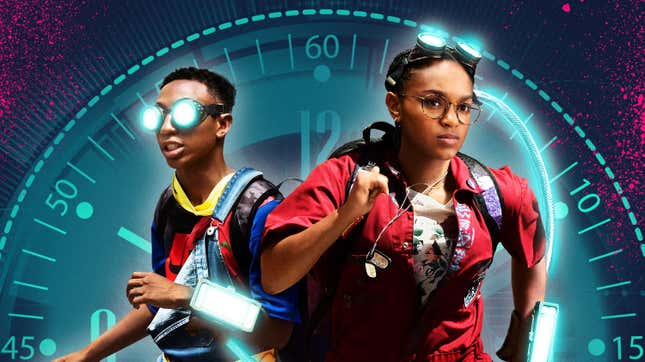
Image: Netflix
As often happens with contemporary art, the past few years have brought an influx of socially focused art that reflects the anxieties of the time. In this case, that anxiety is the specific issue of police brutality and the way it infects and affects black teens’ lives, and how they’re forced to cope with the trauma of ever-present violence. In Stefon Bristol’s quietly subversive See You Yesterday (produced by Spike Lee), police brutality comes face to face with science fiction and the fleeting hope of avoiding the pain of state-sanctioned violence. The Hate U Give with a time travel twist, See You Yesterday is about what happens when the realities of anti-blackness encroach on the dreams of black youth.
Spoilers ahead.
Best friends and science prodigies Claudette Josephine “C.J.” Walker (Eden Duncan-Smith) and Sebastian Thomas (Danté Crichlow) have their hearts set on MIT and Morehouse, respectively, and plan to spend their summer tinkering in Sebastian’s garage to refine their attempts at time travel. After successfully cracking the science involved, CJ and Sebastian go back in time, only to encounter problems that require additional trips, further plans and greater chaos, including the tragic death of CJ’s brother Calvin (Brian “Astro” Bradley) at the hands of police.
Of course, when CJ and Sebastian try to remedy their mistake and bring Calvin back, things go awry: Calvin survives, but Sebastian is shot in a robbery at their local bodega wiping him from their present and leaving CJ to travel back alone and attend his funeral. Yet another trip to the past resets the timeline to the original tragedy, but this time Sebastian is reluctant to continue wielding a power they don’t fully understand. His own death is a wakeup call. The film ends as CJ sets off to the past on her own, trying once again to save her brother despite the apparent cyclical futility of the exercise.
There’s the old joke that time travel isn’t for black people because there’s nothing for us to go back to, and in the film, that idea comes to bear in frustrating ways.
It’s hard not to be resentful of the very mechanics of the film. White teens get three rounds of fairly low-stakes hijinks with the classic Back to the Future trilogy that all have happy endings (cutely acknowledged by Michael J. Fox’s early appearance as Mr. Lockhart, CJ and Sebastian’s science teacher). But for gifted black teens with an interest in STEM, the stakes are immeasurably higher. As Lockhart tells CJ when she contests their B+ grade, the possibility of time travel comes with ethical and philosophical issues that she hasn’t fully grappled with. It’s a lesson she learns the hard way when a minor prank she plays on her shitty ex-boyfriend during their first trip to the past directly leads to Calvin’s death at the hands of trigger happy cops the next day. Black youth do not get access to levity and hijinks. They do not get entertaining (if slightly incestuous) forays into their own pasts. Black teens get localized tragedies as big as any world-ending event; there are no terminators or loops to close, but death stalks them nonetheless.
Despite its trippy colors and manic, eternally excitable energy, there’s an underlying melancholy to See You Yesterday that’s hard to shake. There’s the old joke that time travel isn’t for black people because there’s nothing for us to go back to, and in the film, that idea comes to bear in frustrating ways. CJ and Sebastian can only travel back in time one day, in brief 10-minute intervals, but even that minuscule window is enough to immediately put them in conflict with the kinds of systemic violence that continue to hamper black people in the present. Forget slavery, Jim Crow or the Civil Rights Movement. CJ and Sebastian don’t need to go back that far. Even with the brilliance of young black minds and the harnessing of their combined mental energy directed at a problem not even Einstein could solve, they cannot overcome what is at the root of what ails us; white supremacy transcends space and time. There is no where or when in which it is safe to be black. It’s a crushing reality that cannot be undone even through the bending of space and time.After Sebastian’s untimely demise in the middle of the film, CJ comes clean to Calvin, who, spared death by Sebastian’s demise, has been experiencing an unsettling disquiet. He can’t shake the feeling that it should be him in the casket. Confronted with the truth of the matter in the past after CJ goes back to save them both, he sacrifices himself to spare Sebastian during the deadly police encounter, accepting the inevitability of his fate. It’s the single truly devastating moment in the film because it’s clear that it won’t be undone. That sinking feeling of futility is the lynchpin of See You Yesterday. There are limits to the genius of black people; boundaries to the reaches of our creativity. Not through any fault of our own, but because we are hemmed in by the white imagination; forced into a constant defensive posture in a world more than big enough for the fullness of our best selves.
All of this is what makes the film’s ambiguous ending frustrating but fitting; black futures have always been in a state of flux. Claudette’s decision to jump back just one more time is both a dismissal and an embrace of this fact. Perseverance in the face of futility is inherent to the black struggle. It’s the only way to keep moving forward. Claudette may never be able to change the past, but she can keep trying to reconcile her own future.
See You Yesterday is currently streaming on Netflix
Cate Young (@battymamzelle): smugsexual, thundercunt hagbeast.